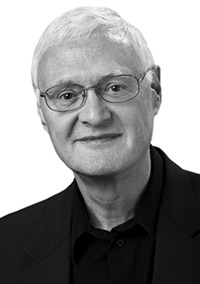
UW officials “are trying to get this right,” says Donald Downs, a noted free-speech expert and an emeritus professor of political science. Jeff Miller
A fresh wave of clashes on college campuses across the country is pitting free-speech advocates against those who say some ideas are so potentially harmful that they shouldn’t be tolerated in an inclusive learning environment.
It’s a high-stakes issue for a public institution like UW–Madison, which is granted significant autonomy, yet is expected in return to safeguard the unfettered pursuit of truth, says Donald Downs, an emeritus professor of political science and an expert on free speech. If the university were to curtail the free exchange of ideas, it would imperil its social contract, he says.
“The people I’ve dealt with in the administration are trying to get this right,” Downs says. “But with this issue, you’re playing with fire.”
This spring, UW officials, watching the issue unfold nationally, issued guidelines that explicitly state the university’s response to protests and demonstrations. While the document doesn’t change policy, it reaffirms a commitment to free speech, teaching, research, and personal safety, says associate dean of students Kevin Helmkamp. The guidelines clarify the difference between protesting, which is welcome, and disrupting, which is not.
“You can go to an event, you can stand up with duct tape over your mouth, you can turn your back on people who are presenting — that’s protesting, and nobody’s going to have a problem with that,” Helmkamp says. “But when your actions prevent somebody else from exercising his or her free speech, that’s disrupting an event. That’s disrupting the university’s mission and values.”
Once a protest or protester begins to infringe on those core values, the administration may respond more assertively with arrest, enforcement of the student conduct code, or both, Helmkamp says.
To head off that outcome, administrators spell out behavior expectations in the guidelines, and they offer to work proactively with students on the logistics of events, protests, or demonstrations.
State legislators waded into the issue this spring, too, drafting a bill that would require University of Wisconsin System officials to discipline students and employees who disrupt speakers. Wisconsin Governor Scott Walker has expressed support for the measure, and lawmakers in North Carolina, North Dakota, Tennessee, and Virginia have proposed similar bills.
Helmkamp acknowledges that the issue elicits strong emotion, especially among students who believe someone’s words make the campus less welcoming or undercut their basic humanity.
“The great joy and the great pain of democracy is that you have these moments where you are passionate about an issue and you want to shut the other side down,” he says. “The challenge to every individual is to rise above those instincts — to see a greater good, and to respond to that greater good with a better argument, a better idea.”
Published in the Summer 2017 issue

Comments
No comments posted yet.